#It's really interesting especially when you remember that Wonder Woman has the lasso of truth
Text
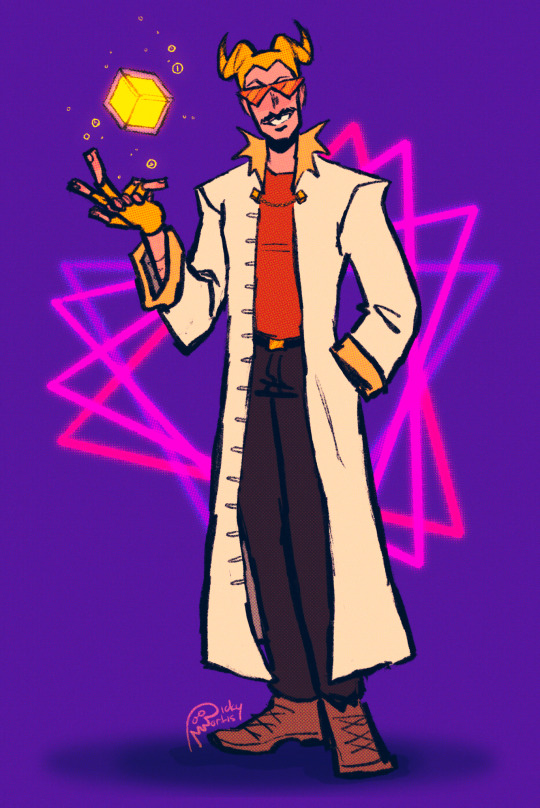
I drew Ted from the wonderful @nabwastaken ‘s Time Bastard Au! The original design is by the talented @midnightnautilus , and was so very fun to draw!
#it’s a very fun au#I enjoy it quite a bit#I mean it’s hard to go wrong when making hatchetfield characters superheroes#although nobody should ever give Ted super powers#my man would wreak so much havoc#he's just a silly guy tho#I loved drawing him in this costume#drawing horns is so much fun#and I got to do a little comic book type halftone moment that I don’t get to do in a lot of my drawings#I love the halftone effect so much so when I find a drawing I can use it with I get very excited#anyways yall should go check out the au#Midnightnautilus has got some awesome art for it and the concept is so very good#let’s see what’s a fun fact for this one#fun fact: the person who created the early version of the Polygraph (lie detector) test also came up with Wonder Woman!#It's really interesting especially when you remember that Wonder Woman has the lasso of truth#Ted spankoffski#hatchetfield#time bastard#time bastard au#hatchetverse#team starkid#starkid#hatchetfield au#tinky#tnoy karaxis#the guy who didnt like musicals#nightmare time#my art#others idea
173 notes
·
View notes
Text
Best of DC: Week of September 11th, 1019
Best of this Week: Gotham City Monsters #1 - Steve Orlando, Amancay Nahuelpan, Trish Mulvihill and Tom Napolitano

Who wanted this?
Serious, this is a strange team of characters to put together for a story, but it’s so jarring in a way that it makes me really interested to see what their team dynamic is like. This book carries so much of a Universal Monster movie vibe while mixed in with the superheroics of comic books in a manner that it’s already caught my eye.
The book begins with several haunting establishing shots of Monstertown, one of the few neighborhoods in Gotham that is doing well under the control of Bane. These shots set the tone for what the story will be; a grimy, dark outing where the only light to be found is in the darkness. Naheulpan does such an amazing job capturing the essence of Gotham, while at the same time making things feel so...40s and 80s right before we’re introduced to our first hero, Andrew Bennett aka. I, Vampire.
Bennett, having been hunting down vampires that choose to spill the blood of innocents, dispatches a large group of evil vampires and learns of a new vampire king that’s soon to be restored to life. Bennett tears out the lead vampires heart and tries to drink his blood to kill him, but finds that his blood is poisonous to him. He then vows to kill their new leader no matter what. Within only a few pages Bennett is established as a noble vampire unlike some of his kin and those who were previously unaware of him are given all that they need to know about the man. His scene also feels very reminiscent of The Crow or Queen of the Damned in terms of style and color palette.
Soon after, we cut to a newly freed Waylon Jones who’s very excited to leave his past life as a criminal behind to carve out a new life in Monstertown, but sadly he knows that people will still only ever see him as Killer Croc. I can see that his arc will be all about redemption as he tries to make things in his life right after all of the turmoil he’s been forced to go through. Part of me wonders if he’ll ever learn about Roy Harper and his death at Sanctuary, given that he acted as Roy’s sponsor when the archer was getting off of heroin. He’s not seen again after his two pages which does suck quite a bit as I thought he would have a larger role starting out.
Things start to heat up as we run into the actual lead character of the story, Frankenstein, former Agent of SHADE. It has been quite some time since Frankenstein has been seen in any book, I think the last one he was in was a Valentine’s Day special from 2018. Before he is even shown, we see patrons of a local bar running in fear of the chaos that the undead one has wreaked in search of one of the last open cases SHADE had before Leviathan destroyed them. Frankenstein is not here to play games, holding the throat of a man infected with a disease that turns him into a bull-man.
Naheulpan draws this scene with the dourness that Frankenstein is often known for as Orlando scripts him to say that “in a far world you would live, but now more than ever… the world is not fair.” Napolitano’s letting also helps to make this scene even more saddening with Frankenstein’s shaky word balloons even if Frank himself is anything but. He lights the man on fire after smacking him upside the head with a bottle of ”Damn Fine Whiskey”, totally not Jack Daniels’, and watches as the creature tries to crawl away in fear and pain, terror in his burning eyes.
After this short excursion, we are introduced to our last few cast members in The Orca and Lady Clay, the latter of whom I had no clue existed. While I have limited experience with Orca as a character, mostly from Nightwing: Rebirth and the Injustice 2 tie-in comic, I know her story (and have an attraction, don’t judge me) and it’ll be interesting to see if Steve Orlando plays into the romance angle from the latter comic to give Croc the strong beau that he’s been missing since Enchantress was taken from him. Lady Clay, however, is new and exciting to me because she doesn’t know who she is anymore and finds solace in taking on the appearances of others like a Faceless Person. I’m very interested in whether or not she’ll betray the team for a sense of understanding from the main villain.
Throughout the book there had been murmurings of an opera going on in the city. This plays as the hook that will cause all of the plot to go full steam ahead in the next issue. While the crowd thinks they’re watching an amazing show, they are soon sacrificed to bring back Melmoth, an immortal whose blood was used to help in Frankenstein’s creation. Melmoth’s entire motivation is to continue being what he considers the “Last King.” He wants to subjugate all beneath his feet and will kill as many as he needs to do so, yet his followers see him as some sort of savior.
Gotham City Monsters succeeds as a story in the vein of the cheesy horror movies I liked to watch at a younger age. The stories and motivations given for each individual hero are simple, much like to protagonists of those old movies and gives this comic a nice monster movie team up feel. Naheulpan’s art is grim and made even better by Mulvihill’s gritty coloring and great use of dark inks for the moments that need shadows. For a first issue, this one was a blast and I absolutely cannot wait for the next one!
---------------------------------------------------
Runner Up: Wonder Woman #78 - G. Willow Wilson, Tom Derenick, Trevor Scott, Norm Rapmund, Romulo Fajardo Jr. and Pat Brosseau

Love is dead. Cheetah has killed her.
The fallout from Cheetah’s actions continue as Wonder Woman has lost her will to fight and is easily overpowered by her most deadly foe. Things begin in the most bleak way possible as illustrated by Tom Derenick. We cut back and forth from the immediate past to the current present as Cheetah wrests or destroys Wonder Woman’s armaments.
Her sword is cut in half and her shield is demolished after swipes from Cheetah’s new Godkiller sword. Her tiara is broken and sent flying after a solid punch. The Lasso of Truth is snatched away as Cheetah mocks her, asking who is truly worthy. Even the Gauntlets of Submission are absolutely destroyed after being hit with the sword.
Cheetah smiles with absolute glee as Diana is driven before her, helpless and unable to defeat her with her new and powerful weapon. She manages to escape into a nearby river and calls Atlantiades to help her. The demigoddess hears her call and with the help of Steve Trevor, they find Wonder Woman, broken and defeated without love.
Superman is commonly thought of as being the main hope in DC and there is a lot of merit to that, but at the same time, Wonder Woman is just as much of an inspiration to some if not more. She has almost never given up hope, even after killing Maxwell Lord in the past or losing her ability to see, hell even after fighting the Amazons after they invaded Man’s World she wasn’t at all fazed. Losing to Cheetah and feeling the crushing weight of the world on her shoulders now that she doesn’t have the hope of love to keep her head up high. It’s even worse when Steve Trevor is also suffering from this lack of love. Even while giving Diana a soothing bath for her injuries and trying to console her, his eyes are empty of the love they had and she can tell.
Not only is love gone, but so is compassion as we see in a short scene shortly after the bath. A mail carrier on a bike accident hits a car and no one does anything to help him. It's telling that people just either drive around him or stand idly by seeing no reason to try to walk through traffic. We see even later on that people are far more willing to commit crime, especially after Lex has been offering people gifts and changing how they think, bringing out the darkness inside.
Eventually Wonder Woman is left with no other choice than to ask Veronica Cale for help. Veronica Cale, who has nothing but enmity for Wonder Woman, decides to help her as she doesn't even remember the feeling of dread that she had when her daughter was trapped in Themyscira and see this as an opportunity to show the Gods that mortals can see what they cannot.
In a way, Cale and Cheetah are similar in that regard. They have nothing but hate for the Gods and Wonder Woman and will do everything they can to tear them down, Cale with wit and guile and Cheetah with pure rage.
G. Willow Wilson is absolute bringing out the bloodlust from Cheetah that we haven't seen in some time and is making her a pretty credible threat. If her trajectory continues the way that it jas, then there's no doubt in my mind that this entire run of Wonder Woman will end in one of their deaths and that is exciting.
#dc comics#dc#gotham city monsters#frankenstein#killer croc#i vampire#steve orlando#amancay nahuelpan#monsters#wonder woman#cheetah#steve trevor#veronica cale#g willow wilson#tom derenick
12 notes
·
View notes
Text
9x10: Music References and Ties to Beth
Okay, here goes. One of the things I really loved about this episode was how much of it revolved around music. The biggest things that jumped out to me were, of course, Lydia and the fact that her dad sings to her in flashbacks. There are some major Beth parallels going on here.
Because Beth was the song bird, we automatically tie any and all musical references to her. And there were TONS in this episode! We also saw the songbird pull the worm from the walker’s ear when this arc began (after Rick left) which gives us a lot of hope that Beth will show up somewhere in this arc. Keep in mind that doesn’t mean she has to show up this season, but we hope she will.

Alpha sang to Lydia and calling her “Bug.” Later, we find out it was actually her father who sang to her. That's significant because, back in S2, we saw Herschel not exactly singing to Beth but sort of chanting the rhyme to her about the doodlebug. It was their thing that they did together to bond and it brought her comfort when she got sick (emotionally/psychologically) after the walkers came out of the barn.

So anyway, Beth’s father called her Doodlebug and sang to her. There have been many theories by me and various members of TD about the doodlebug rhyme and the closely connected ladybug symbol, which we know is a major symbol for Beth. (Remember, she was associated with ladybugs in Still when she picked up ladybug off the leaf.)

We didn’t actually see Daryl watching Hershel sing to Beth, but he was probably aware of it, and he knew how close Beth was to her dad. We also know he watched her sing to Judith as a baby to comfort her, so he’s definitely seen people sing to their children before, specifically to keep them from being afraid. So, I really loved that when Lydia told the truth about her father singing to her when she was afraid, Daryl immediately recognized it as true and used it to differentiate Lydia’s truths from her lies. I think that’s super significant and can be tied directly back to Beth and Daryl’s memories of her.
On TTD, they said that the person who wrote the lyrics for the song Lydia’s father sang her (Lydia, the Tattooed Lady) is the same person who wrote all the songs for the Wizard of Oz (TWOO).
That's super important for several reasons. They went out of their way to point it out on TTD, which means they really want us to know about it. Obviously, knowing who the lyricist is, isn’t something we need to know in order to understand the show. They also reminded us that we'd seen Rick reading the Wizard of Oz book to Judith in 9A, before the bridge blew.
Now, I really need to update my Wizard of Oz theory, but remember the first place we saw the Wizard of Oz template was at Grady with Beth. Seeing it with Rick just reinforced that she's as much alive as Rick is. Both of them were injured and woke up in a faraway, strange land, separated from their friends and family. So, because we know Rick is alive, and they associated him with the TWOO template (Dorothy survives at the end of the story makes it back to her family; she doesn't die.) we can use that as evidence that Beth, too, is alive and well somewhere.
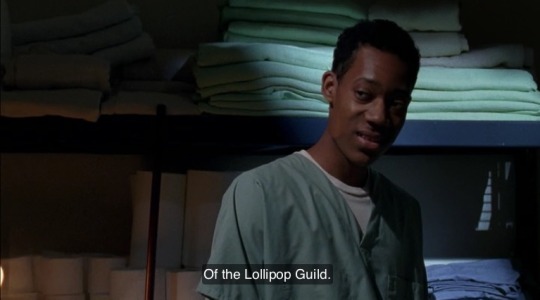
I also find it to be entirely too coincidental that they mentioned TWOO on TTD and in this episode, Daryl said to Lydia, “You don’t know shit about me.” Noah said that to Beth at Grady and he was also the one had the “of the Lollipop Guild” line. See the subtle ties? Tptb went out of their way to tie this episode heavily to TWOO and, by extension, to Grady.
Let's talk about the Tattooed Lady song. I looked at the lyrics and let's just say that there are a lot of extremely random references included in the song.
Here they are:
Lydia, oh! Lydia, say have you met Lydia
Oh! Lydia, the tattooed lady
She has eyes that folks adore so
And a torso even more so
Lydia, oh! Lydia, that "Encyclopedia"
Oh! Lydia, the Queen of tattoo
On her back is the Battle of Waterloo
Beside it the Wreck of the Hesperus too
And proudly above the waves
The Red, White and Blue
You can learn a lot from Lydia
She can give you a view of the world
In tattoo if you step up and tell her where
For a dime you can see Kankakee or Paree
Or Washington crossing the Delaware
Oh! Lydia, oh! Lydia, say have you met Lydia
Oh! Lydia, the tattooed lady
When her muscles start relaxin'
Up the hill comes Andrew Jackson
Lydia, oh! Lydia, that "Encyclopedia"
Oh! Lydia, the champ of them all
For two bits she will do a Mazurka in Jazz
With a view of Niag'ra that no artist has
And on a clear day you can see Alcatraz
You can learn a lot from Lydia.
La la la La la la La la la La la la
Come along and see Buff'lo Bill with his lasso
Just a little classic by Mendel Picasso
Here is Captain Spaulding exploring the Amazon
And Godiva, but with her pajamas on
La la la La la la La la la La la la
Here is Grover Whalen unveilin' the Trylon
Over on the west coast we have Treasure Islan'
Here's Nijinsky a doin' the Rhumba
Here's her Social Security numba
La la la La la la La la la La la la
Lydia, oh! Lydia, say have you met Lydia
Oh! Lydia, the champ of them all
She once swept an Admiral clear off his feet
The ships on her hips made his heart skip a beat
And now the old boy's in command of the fleet
The song is about a woman who has tattoos all over her body. Most of them have to do with real people or historical events. So, the idea is that you can learn a lot from looking at her tattoos. Not all the references jump out at me as meaning something significant, but a lot of them do.
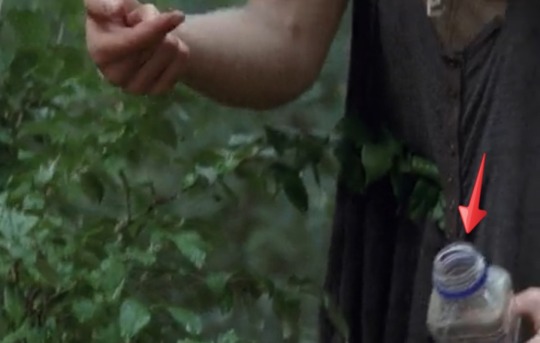
First, a LOT of them are water references. (Remember water =s Beth). It mentions the Battle of Waterloo, which I think is a dual symbol for the coming war with the Whisperers and also the fact that it includes “water” in the title.
It mentions The Wreck of Hesperus, which is a poem by Henry Wadsworth Longfellow about a shipwreck. This one is super interesting to me because the captain of the boat wrecks his ship due to his arrogance. His little daughter is on board. I just couldn't help but think of this shot where we see this boat in the storm, talking about a sailor behind Hershel.
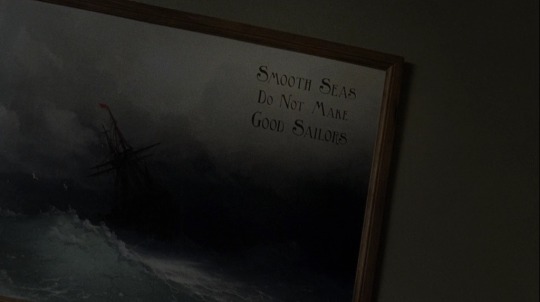

I feel like we could substitute Herschel and Beth into this poem as the captain and his daughter.
The song mentions Treasure Island, which is an artificial island in San Francisco Bay. So again, more water references.
It also makes mention of different waves of the sea, Niagara, and the Crossing of the Delaware, which was when George Washington crossed the Delaware River in the dead of night to attack his enemies. For the record, that story is considered a modern-day miracle. It also mentions a fleet of ships tattooed across Lydia’s hips. There are probably a few other water references. Go through the lyrics and see for yourself.
Other references that jumped out at me include Buffalo Bill. I wondered if he, being a great hunter, could perhaps be a symbol of Daryl. One thing that caught my interest when I read about him was that he compared his strategy for hunting buffalo to a game of billiards. Obviously, we’ve see that in association with Beth and Daryl.
It talks about Capt. Jeffrey T. Spalding, who is a fictional character, but he was a great world explorer and went on many long journeys. Again, that reminds me of both Beth and Rick's long journeys.
It mentions the Trylon and Perisphere, which were central themes of the World's Fair in 1939. I wondered if perhaps that could point to the fair that's going to be at the Kingdom that they keep foreshadowing.
Finally, it also mentions a man named Vaslav Nijinsky who was a great ballet dancer. Music box anyone?
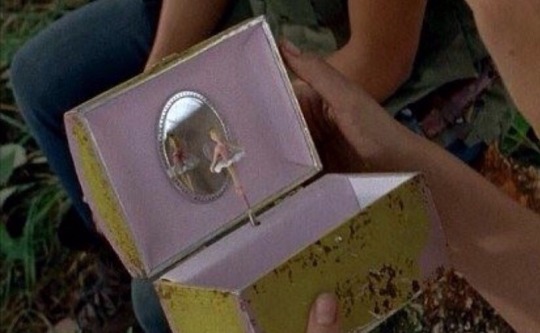
So I don't know if they mean for us to read into the references in Lydia, the Tattooed Lady. I think the a big part of the point of mentioning it on TTD was to point out it's ties to TWOO, which is clearly tied to Beth.
But we also did hear much of the song in the show, so I think that means the lyrics themselves are very important as well. I reserve the right to analyze the crap out of them. ;D
This is slightly off topic, but me, @frangipanilove and @wdway have also talked about the song, Somewhere Over the Rainbow from TWOO. The lyricist who wrote Lydia, the Tattooed Lady, Yip Harburg, also wrote all the TWOO songs, including the famous Somewhere Over the Rainbow.
We’ve talked about how a lot of the symbols in that song can easily tie to Beth. I’ve never talked about the song in my TWOO posts before, but obviously I should. The mural on the prison wall back in S4 included a rainbow, which is further proof that Beth’s arc and these symbols were planned back then, when Beth first came front and center.
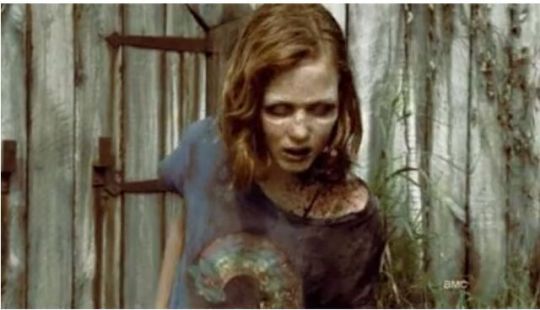
@frangipanilove also pointed out that the shirt Sophia wore when she came out of the barn in S2 had a rainbow on it. That’s a great way to associate Beth with the Missing Girl theme. The song talks about wishing on stars (North Star Theory, Sirius/Dog Star Theory) and songbirds (Beth and the songbirds with Daryl and the tree walker in 5x06). And of course there’s the fact that Dorothy has a dog named Toto.
And keep in mind the basic plot of TWOO. Dorothy, who wore a lot of blue
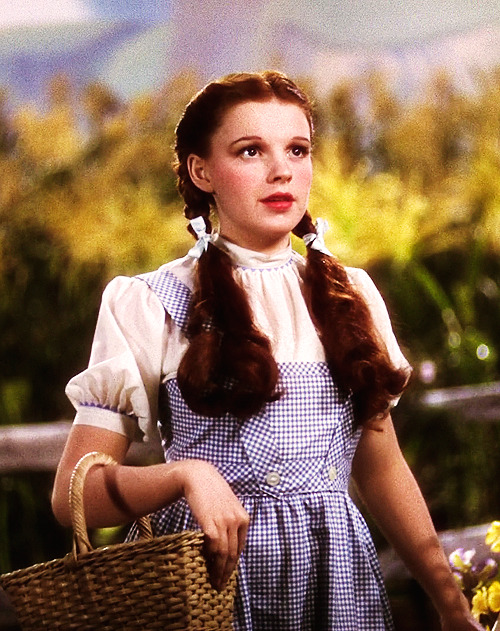

hits her head (obvious head injury) and passes out. She wakes up in a far away land, away from her friends and family and spends the entire episode trying to get home.
This is why I can totally see them first bringing Beth back somewhere other than TWD (perhaps in Fear or another spinoff) so they can tell her story without completely taking over the main story line. But we’ll just have to wait and see.
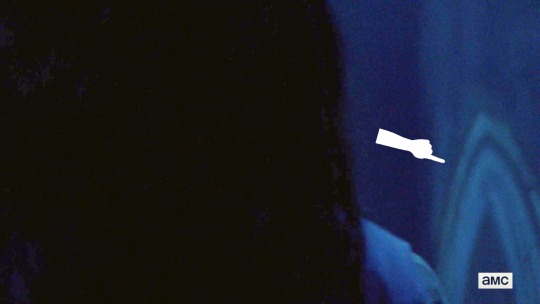
I also noticed that we see a rainbow on the wall near Lydia that mirrors the one at the prison. Hmm. Especially given all the water references, could Alpha function as the Wicked Witch? Really no idea. Just conjecturing. But remember that in TWOO, it’s water that defeats the villain. (I’m melting!) Just saying. ;D
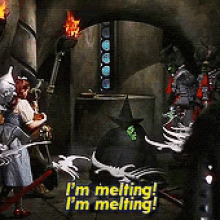
So, this is been kind of a rambling post, but there's a lot of music floating around this episode, and I can't help but tie it to Beth and feel like she's very close. Thoughts?
#beth greene#beth greene lives#beth is alive#beth is coming#td theory#td theories#team delusional#team defiance#beth is almost here#bethyl
11 notes
·
View notes
Text
What the Wonder Woman Movie Tried to Do
(Disclaimer: Any quotes are as I remember them from my three viewings and almost certainly not word for word. I unfortunately do not have unfettered access to the movie.)

In the wake of the release of this amazing movie, many people have talked about the decision to set the movie during World War 1. I’m not historically informed enough to get into details, but it’s not hard to learn that World War 1 wasn’t nearly as 'good vs evil' as World War 2. Nazi’s weren’t a thing yet, the holocaust wasn’t happening, and neither side had much in the form of moral high ground.
And that was important to the message of the movie. At the end, Diana—in a voiceover—sums the message up, stating that there is a darkness inside people’s hearts, a terribleness, that each individual must battle, and it is through love that the light they also carry can defeat the dark.
I want to look at the ways the movie was telling us that this battle exists in everyone, and then articulate how it failed to effectively show this: articulating to us that the battle had never been black and white and that the Germans were not strawman villains.
Diana begins the movie naive, and through the course of it, her understanding widens, and we follow her journey. We’re first introduced to the Germans by Steve Trevor after he crashes into Themyscira. Right away, he tells Diana that he’s a good guy, and those “are the bad guys.” Pretty juvenile language. He’s trying to convey something very quickly, and in doing so, he gives the audience the ‘layout’ of the movie.
Unfortunately, we never really leave Steve’s perspective on this. He is Diana’s POV and guide through this war. And this sets up how the movie fails in showing us that the Germans are also as whole and complex indiviuals as the English.
Despite the fact that Diana is portrayed naive in many ways, when first discussing the war, she insists to Steve that Ares has corrupted these Germans, and if she can just defeat him, they would be free of his influence.
And in fact, the first German she speaks to, she wraps in the Lasso of Truth, asks where Ares is, and declares she is asking for his own good. Despite him having just attacked them, she’s insisting that, if only a corrupting force didn’t exist, he would be a good man.
I think it’s important that our heroine never truly believes that the Germans are all bad guys. In the end, it is what tests her faith in humanity, the moments when she discovers Ludendorff wasn’t the god of war and when Ares, under the power of the lasso, says he never made anyone do anything—merely showed them the way.
The corruption, the darkness, cannot solely be laid at Ares’s feet.
And her faith before this, and the faith that results in the end, are all the more powerful for it.
But our villains are decidedly a German commander, Ludendorff, and his scientist, Dr. Maru. In each of their scenes—to which there are several—they are depicted as agents of destruction, relishing in the power of the gas weapon Dr. Maru created to the point of sadism. This emphasizes Steve’s statement at the onset: Germans are the bad guys.
The Englishmen need to fight them.
And yet, when Diana arrives in England, she sees men talking over pleas for peace. She asks Steve why they won’t let Sir Patrick talk when he’s discussing peace. I wish they would have followed up on that better, because despite it, the next time they’re in conference with the heads of the army, they refuse Steve when he asks to go in and take out Ludendorff’s new weapon on account of the peace talks. Steve presses the need to do this or else “hundreds of thousands will die on both sides.”
The fact that he includes ‘on both sides’ to a room full of men who almost certainly don’t care about the Germans is an interesting piece of dialogue to include… an important one. Steve may have oversimplified: “me good; germans bad” at the beginning, but this expresses a belief he holds—one I suspect he develops over the course of the movie until he asks if he is just as much at fault. That sounds like another meta though.
The general replies to Steve’s plea: “They are soldiers; it’s what they’re supposed to do.” [die] This is coming from one of the supposedly ‘good guys.’ Fortunate for us, Diana is having none of it. She calls him out, telling him that he’s a bad man if he sits and does nothing while thousands die. And I think the fact that we, as the audience, don’t see this general’s statements as actually 'evil’ is our own perception of what becomes necessary in war—something Wonder Woman would clearly, adamantly, disagree with us about.
On a somewhat side note: he asks who this woman is and dismisses her berating of him on account of it and has, so far in the movie, repeatedly shown her nothing but contempt; something we only see from the English side of this war interestingly enough. Diana, Princess of Themyscira, has her presence repeatedly questioned because she is a woman, but Dr. Maru exists in Germany with seemingly no issues surrounding her gender.
But Diana and Steve are going to save those hundreds of thousands anyway. He takes her to collect 'backup,’ and they pick up Charlie and Sammy, two men she initially dislikes for being a liar and a murderer. She immediately questions their goodness, which I think was an important step for this movie. For this to be their message, she had to have allies that even she doubted. She does seem to accept it quickly enough though despite neither of them proving for quite time yet that they are, in fact, good people.
She’s starting to learn. People are complicated. The good guys are leaving their own to die. The good guys won’t stop Ares. The good guys dismiss her because she is not a man. So… what are the bad guys like anyway?
They board a train and head for “the front.“ As they get off, we see a crowd of English soldiers, singing war songs, looking hopeful and ready for a fight. Feels a lot like naive Diana, but they don’t have the purpose she does, so instead, it comes off feeling far more like they’re experiencing a nationalistic fervor—a blind loyalty to stay on mission, follow orders… just like the soldiers in Veld later must have felt.
And then Diana and co. continue on, and we see those who have already fought, and they are shell shocked and wounded and far from cheerful. It is an exchange much like you can’t help but imagine is happening in kind on the German lines. And each nation chooses to continue this exchange, sending more sheep in the place of those who come back wounded, unable to continue fighting.
And then we meet Chief. And Chief… he’s especially interesting. He does two things with this narrative. He is introduced as a smuggler: he provides goods to both the English and the Germans for profit. This means, he’s the closest we get to a POV from the enemy side that isn’t evil. And when she calls him on it—for aiding, even in a small fashion, the other side—he says it’s what he has left after his people were destroyed, and when she asks who destroyed them, he points to Steve.
Steve. The good guy
The Englishmen. The English destroyed a people
They are not paragons of perfection
The movie doesn’t linger on this or even have Diana question it, but she also doesn’t call Chief a liar. She seems unsettled, and she lets the subject go, and later, we observe Chief interact with Steve’s men in the trenches, and he is like a saving grace to them. Diana sees no evil in him despite what she is told he does/who he associates with.
And then we have Diana, talking to Sammy about Charlie, the man who kills without honor. She remarks on how he couldn’t do what he said he can, and Sammy replies that “Not everyone can be who we want to be all the time.” What a wonderful, beautiful, human line. I LOVE this line.
“Not everyone can be who we want to be all the time.”
And it’s so true. Interestingly, the way he responds to her question, it sounds on some semantic level like Charile wants to be the murder her claims, but that’s not what Diana sees. This reveals to her a man who never wanted this sort of life and who suffers because of it (his flashes of PTSD/nightmares), and she knows he isn’t evil. He’s… complicated. Yes she saw a darkness there, but now she sees a light.
Sammy reveals to her he always wanted to be an actor, but his 'skin is the wrong color.’ That has nothing to do with the war. The way she was treated as a woman had nothing to do with the war, nothing to do with Ares. This is complicated in a way she’s not prepared for and sowing the seeds of understanding later on. And the exchange ends with Sammy telling her, “We’re all fighting our own battle Diana.”
We all are.
BUT, the Germans we got to know are unquestionably evil. Only, there are some hints that perhaps Ludendorff and Maru do not represent all Germans. We get a scene where the Germans are revealed to be cold (huddling around trash fires) and starving and without sleep. The German man we see trying to defend his men and their plight to Ludendorff gets killed brutally and without warning by him.
Ludendorff is evil, even to his own people.
And then we get to meet Germans arguing for the armistice. Sure, they appear to be doing it because they have nothing left to fight with, but even when Ludendorff insists there is, they refuse him. After all, we had plenty of Englishmen yelling at Sir Patrick, trying to drown out his talks for peace. But Ludendorff kills those Germans who would do the right things, viciously and brutally and with great pleasure.
And we have the gala. We have Steve and Diana in a position to take out the key players, and Diana insists on doing so… but Steve stops her. He lets Ludendorff get away and order the strike against Veld. If he hadn’t stopped Diana, an entire village would not have perished, because Ludendorff would be dead. Even though he wasn’t Ares, in the confusion and without a sadist at the helm, Veld would not have perished. This does not make Steve guilty of their slaughter, but it still stands that if he had acted differently, they would not have died, and Diana tells him as much.
(I think this is the closest the movie was willing to get to make Steve culpable, so I find it important to read it as such. It was an attempt at showing one of the English, someone close and important to our protagonist, make a human error of destructive proportions. They didn’t want to make Steve look too bad and lose the audience’s sympathies though, so it was played down and maybe even lost some of it’s impact/purpose.)
And then, then Ludendorff is dead, killed by Diana, but the war is not stopping. And Steve arrives and tells her he needs her help. She realizes, quite on her own, “It’s all of you. My mother was right, you do not deserve me.” Steve doesn’t contradict her statement that it’s not ‘all of you’ and instead, he seems to finally fully take it to heart. It is all of them. Humans. Perhaps… even, it’s him. He has reached a realization that there has been complicity on each side. He certainly has a certain weight on him after what happened to Veld. He asks her, “Don’t you think I wish I could tell you there’s one bad guy making this all happen? But what if it’s not? What if it’s us… Maybe it’s me.” And his guilt and this realization drives him. It drives him to beg Diana to see that although he has caused harm, his belief was in saving those people and his belief now is to save more and to end the war, that he’s going to back up those beliefs with action, and if that isn’t good for something, what is?
And it’s so… so fascinating that Diana’s arc includes her coming from a naive sense of nobody being evil unless corrupted, to seeing that no, there is evil within humanity, and then to return to something adjacent to her original conclusion but with more nuance and more accountability on those who fight those battles… it’s just… it truly is beautiful. The corruption isn’t just Ares, it’s inside them all along, and only they have the power to overcome that.
There are two things left—I know, this is getting so long—that tells me the movie was truly trying to convey that Germans weren’t just 'the bad guys.’ The first is that Ares turns out not to be a German at all, but English.
This is actually a bit strange, given that his origins do not make him English and it’s also undercut by the fact he isn’t a human.
BUT! He had a position of power and was allotted that power by the English. And it makes it all the more clear that he was influencing both sides of the war, a puppet master driving his dolls to destruction. He reveals that he didn’t make anyone do anything, merely gave them the thoughts and the knowledge and the power to do them. He kindled their darkness where Diana would have kindled their light.
But the final, and perhaps most obvious attempt at this, comes from the Germans, realizing their leaders were gone and their weapon destroyed, standing down. Taking off their gas masks, showing they are all but children, and showing utter relief that it’s over. Chief even grabs and hugs one of them. Remember, Chief smuggles for them too. He might actually know some of these kids.
So yes. I believe the movie in many, many ways did attempt to portray the Germans as not entirely evil and not entirely culpable. I’m just not sure they effectively managed to show us this.
I get the sense that the movie really, really wanted to surprise us with Sir Patrick. Wanted to surprise us with their message. We’re so inundated with imagery of the Evil German, that it was so easy to prey on this iconic representation of evil without question, that we would be unprepared for when they reveal that no, this struggle of good and evil exits inside everyone, not just the Germans. In doing so, they gave us more than two full hours of confirming our long set bias in this matter and listening to the characters call the Germans bad, watching our heroes kill them, and being disgusted by Dr. Maru and Ludendorff’s sadism, that there simply needed to be MORE to provide a counterweight.
We needed something clearer.
We needed a German character to assist—perhaps one of those occupying Veld who switches sides and tells them he could get them into the gala to stop Ludendorff, because patriotism isn’t worth it when weapons like those are being created.
A German soldier switching sides upon learning a German commander would kill hundreds of his compatriots in order to obtain victory over their enemy.
We needed the English to have created an awful, terrible weapon they would threaten to use against the Germans if the armistice wasn’t signed. An English scientist eager to try out their invention.
We needed, somehow, to see the English be an Active participant in the war and not just responding in defense of… what?
We needed Diana telling someone that the Germans are truly good, just under the influence of Ares, and have someone ask her how it is then that she can fight and kill them so easily, without hesitation.
What I wouldn’t have given to hear Wonder freaking Woman tell someone that stopping people from hurting others, despite what they might think their intentions are, is more important than letting them do so.
We needed clear cut articulation that there are bad (human) Englishmen (that don’t transform to goodness) and good Germans. We never really got 'good Germans.’ We just got 'Germans who are glad the fighting is over.’
Like yes, it’s poignant that the Germans we see at the end are practically children, but the scene passes so quickly and without even a line from Diana such as 'They’re children!“ to drive it home to the audience, that it doesn’t outweigh the two+ hours we got of seeing them be villains.
If the movie hadn’t tried to save the punchline of this message until that last moment, there truly was so much room in the narrative for it to have been obvious, and the message would have been cleaner, more poignant. As it stands, there’s a certain emptiness to the message unless you really look into the examples I mention above, and on a first watch, one where the movie likely successfully fools you with it’s 'Germans bad’ misdirect, it’s so easy to overlook the other examples as unintentional or having different implications.
I do think they were intentional though. I just believe that without presenting a good German character, one who battles their darkness and finds their light, there was no way for the movie to manage it. A message like the one the movie aims toward should not be subtle. It’s a message too important to let the audience walk out of unsure about.
I know I, for one, will be watching out for an extended cut, where I hope they will have included either an improvement I suggested, or something else to that effect.
#Wonder Woman#spoilers#meta#commentary#World War 1#long post#good vs evil#for the record this is still my fav movie of 2017 and despite this flaw I love it so so much#black vs white#Wonder Woman spoilers#ThoughtfulfangirlingCommentary#wwmeta#TFGOC
50 notes
·
View notes